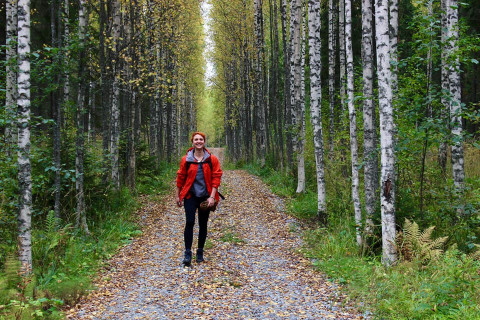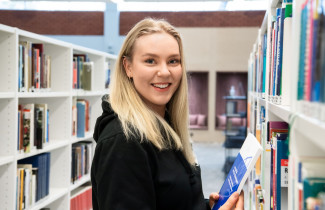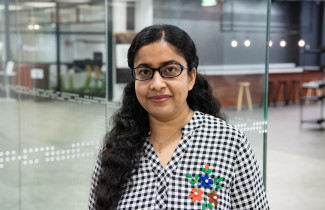While studying for her bachelor’s degree in social and communication sciences, Swiss-born Laura developed a deep interest in quantitative research methods and data analysis. She worked in the field of market research for a variety of clients, both private and public, but realised that she wanted to focus on public good. She decided to study public health, which she saw as a great way to build upon where she was coming from. The interdisciplinary nature of the University of Eastern Finland’s programme caught her eye – and eventually got her to where she is now.
Finland as a study destination was a natural choice for Laura, who has Finnish roots. Having spent many summers in a cottage in the Finnish countryside, she was eager to immerse herself in the culture and learn the language. The University of Eastern Finland’s Master’s Degree Programme in Public Health seemed broad and versatile enough to meet her professional needs.
“I knew the education would be solid. I had heard so many good things about the Finnish educational system,” she states.
Expectations meet reality
Upon arrival she found her previous knowledge of the country and its culture to be rather limited, despite the time she had spent here. She was well familiar with summer and sausages, fishing and strawberries, but many other things came as a surprise.
She had prepared to have only Finns as friends even though she was aware that “all Finns are very asocial”. Her goal was to perfectly integrate into Finnish society. However, things turned out differently, and she got to know that many Finns are actually very open. In addition, she ended up having lots of international friends, too – something that she found very enriching.
Meanwhile, her plans to learn the Finnish language quickly were not going so smoothly.
“I knew that Finnish was hard, but it was harder than I imagined. However, I was really surprised by how encouraging Finnish people are – I got nothing but support from them while trying to learn the language,” she says.
Struggles followed by rewards
The beginning of Laura’s studies was a challenging time for her. She wasn’t used to medical vocabulary or studying in English. The first month was really hard, she says. But with the help and encouragement of her fellow students and the university staff, she made it.
“When I was struggling, I found it nice that I could go to a professor or the study coordinator to talk about my fears. I felt it was a safe space to talk, and I got real support,” she says.
After the first semester, the situation improved and she adapted to her new environment.
“Having done the programme, I now feel very confident. I can actually work in English. My English has improved drastically thanks to the programme,” she says.
Atmosphere and opportunities
Laura highly appreciates the collaborative and non-competitive atmosphere at the university. The prevailing peer support culture allows people to build from the bottom up. As Finnish society is not very hierarchical, hierarchies are not pronounced in the university context either. She feels that there is enough space and resources for everybody, and your own initiatives are very much encouraged.
“You get out of the programme what you invest in it,” she says.
She was given the opportunity to really put her skills, knowledge, and experience to use and to benefit others. It started with an informal workshop where she was helping her fellow students on basic data handling. In the end, she was teaching her own 2-credit course on the subject.
Career prospects
The versatile, interdisciplinary nature of the studies gives the students a solid foundation to proceed to various careers. Some students can join research groups during their studies and work, for example, as part-time research assistants, like Laura did. Her active approach led her on a career path that has taken her far. She is currently doing research one day a week, and on the other four days she works for the Swiss government in the Department for Health Services.
“In the programme, we touched on so many different fields and learned to ask questions and find information that there are many fields that are open to us,” she believes.
The ongoing pandemic has turned out to be beneficial for her, as it has given her opportunities she would not necessarily otherwise have had. The digitalisation following the new circumstances has allowed for a transnational lifestyle. As both her research and work can be done remotely, she can divide her time between Switzerland and Finland.
Laura is planning to pursue a doctoral degree in the field, and in the future, she hopes to continue with the arrangement she has had since her graduation in spring 2021.
Welfare state and digitalisation
“I was amazed at the welfare state. From the student perspective, it means that you have access to very affordable health care, and you get good-quality, cheap food at the university, because it’s subsidised. I can borrow plenty of things from the library that I would’ve never thought could be borrowed. Those things are worth experiencing,” she comments.
With a keen interest in social and gender equality, Laura was also impressed about the fact that women are an active force in the country.
“I really like that in Finland you really feel that women are everywhere – in politics, in senior management, in research, and so on,” she says.
Furthermore, the high level of digitalisation in Finland and the advanced stage of things like telemedicine have been important to Laura workwise. Having lived here for four years, and still living here part time, she has gained ideas on where digitalisation might go in Switzerland in the years to come.
“Many things that are already in place in Finland will be, in one way or another, more relevant in Switzerland in the next ten years,” she thinks.
Lovely nature for everyone to enjoy
Even though Switzerland has stunning mountains, Laura was astonished by nature in Finland.
Back home, winter sport facilities are outside the cities, as there isn’t that much snow in urban areas. But here it’s different – Kuopio certainly has snow. She has been able to try many things for the first time, such as cross-country skiing, and she says she fell back in love with winter sports while here.
“Nature is very lovely in Finland – and it’s right there in Kuopio, easily accessible,” she says. “I’m hooked on ice swimming, and the sauna culture is brilliant. In addition, you can go hiking and ice skating everywhere.”
The freedom to roam, or “everyman’s right”, that gives everyone access to public or privately owned land, lakes and rivers for recreation and exercise gets a big thumbs up from Laura.
“In summer, it’s so easy to go camping – you have the right to camp anywhere. And berry picking and mushroom picking and all those kinds of things are a really big deal.”


